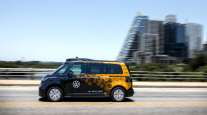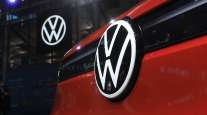Senior Reporter
VW Truck & Bus to Be Renamed Traton Group

Volkswagen Truck & Bus announced it will rename itself Traton Group to further increase its independence from parent company Volkswagen AG and toward “capital market readiness” in preparation for a potential IPO by the unit.
Separately, Ford Motor Co. announced it is exploring a strategic alliance with Volkswagen AG regarding commercial vehicles — possibly for last-mile deliveries, an analyst said.
“The new name Traton is a major milestone on our road to become a global champion of the transportation industry,” Volkswagen Truck & Bus Group CEO Andreas Renschler said in a statement. “It will increase our attractiveness for new talents as well as for capital markets [that would help it sell stock or debt on its own].”
A new Champion for a new era: #TRATONGROUP
— Volkswagen Truck&Bus (@TRATON_GROUP) June 20, 2018
Volkswagen Truck & Bus’ brands include MAN, Scania, Volkswagen Caminhões e Ônibus and RIO. The name change is expected to be complete by the third quarter.
Also, granting the commercial vehicle unit more independence would help build confidence among investors that VW is considering deeper organizational changes, heralding more efficiencies in the wake of the diesel-emissions scandal, according to Bloomberg News.
Advocates of heavy-duty engines powered by diesel or natural gas are separately vying still for a share of the windfall directed at nitrogen oxide mitigation in all 50 states after judicial approval in 2016 of the federal government’s multibillion-dollar settlement with Volkswagen AG. At issue was years of excessive emissions from some of VW’s automotive vehicles.
Turning to Ford, “We are obviously in the early days [of talking with VW],” Ford spokesperson Jennifer Flake told Transport Topics, “Our [memorandum of understanding] covers conversations about potential collaborations across a number of areas. At this time, though, it is premature to share additional details.”
Commercial customers are changing like never before, VW spokeswoman Leslie Bothge told TT.
“Tapping and applying knowledge from both companies to better serve these customers makes sense,” Bothge said. “Many challenges are ahead of us, such as increasing competition, regulation and new trends, such as e-mobility, digitalization and more: Investments in the magnitude of several billion euros are required. We want to strengthen our competitiveness to master the challenges ahead of us in the most efficient way.”
An alliance by VW and Ford would not involve equity arrangements, including cross-ownership stakes. VW Truck & Bus owns about 17% of U.S. truck maker Navistar Inc.
“Both companies have strong and complementary positions in different commercial vehicle segments already,” said Thomas Sedran, head of Volkswagen Group Strategy. “To adapt to the challenging environment, it is of utmost importance to gain flexibility through alliances. This is a core element of our Volkswagen Group Strategy 2025.”
Automakers across the globe are exploring ways to share expenses for developing light commercial vehicles, including electrified models, as cities including Paris and Shanghai push to improve air quality. Ford CEO Jim Hackett has his company on a “fitness” campaign to cut $25.5 billion in costs and is seeking partners along the way, Bloomberg reported.
ACT Research Co. President Kenny Vieth suggested an eventual strategic partnership might make sense by focusing on commercial vans.
“I think it might be something to compete against the Sprinter van [from Daimler AG], and that last-mile space is a hot topic right now. So that would seem to be the likely target on this. Maybe, you would get up to Class 4, but I think it would be more a Class 2, 3, 4 product.”
Ford has a strong presence in U.S. retail sales of Classes 2-3, according to WardsAuto.com. It is the leading manufacturer of Class 5 trucks. It also has a strong position in Class 6 sales, notching the highest market share some months and not far behind in others.
Other than in Class 1, VW posted no U.S. retail sales in May, according to Ward’s.
“Ford is committed to improving our fitness as a business and leveraging adaptive business models — which include working with partners to improve our effectiveness and efficiency,” Jim Farley, Ford’s president of global markets, said in a statement. “This potential alliance with the Volkswagen Group is another example of how we can become more fit as a business while creating a winning global product portfolio and extending our capabilities.”




